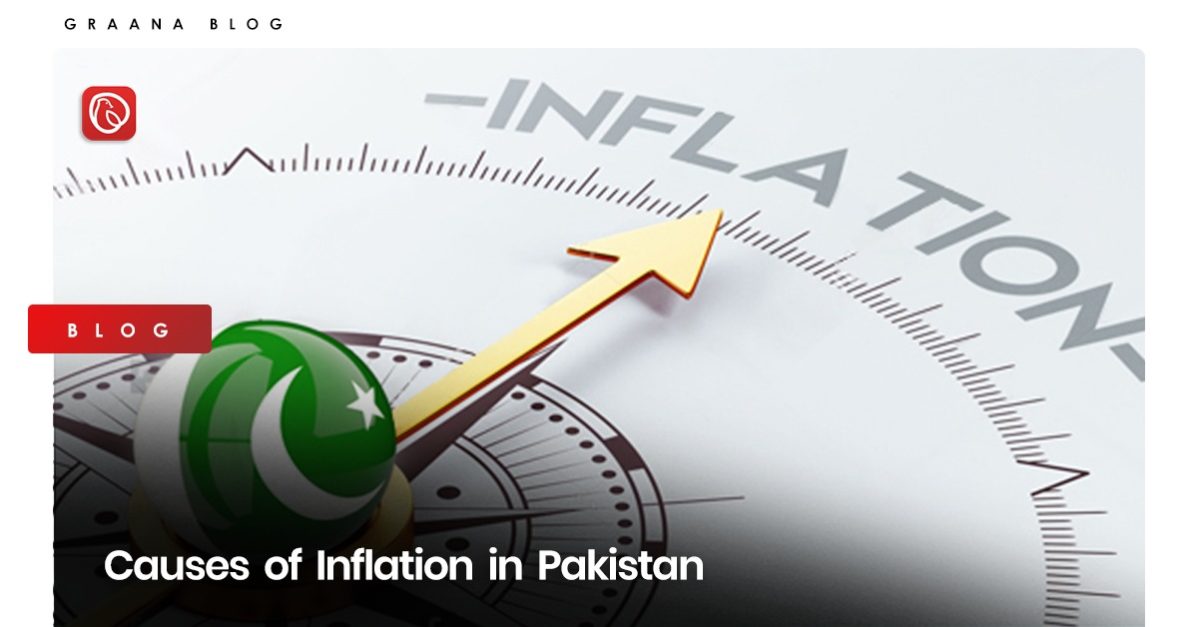
Inflation can be defined as the gradual rise in the average cost of goods and services over a given period of time. For many years, Pakistan’s economy has struggled with inflation, due to many different factors. Graana.com gives an overview of some of the main causes of inflation in Pakistan below.
Inflation is referred to as a sustained upward trend in the average cost of goods and services over time. In other words, there is a decline in the value of money as a medium of exchange.
Several factors, such as an increase in the printing of money, a decline in the availability of products and services, and a rise in consumer demand can bring about a rise in inflation. The Consumer Price Index (CPI), which records the prices of a selection of goods and services over a specified period of time, is commonly used to measure inflation.
An economy can be affected by inflation in both positive and negative ways. One way it can do this is by enticing people to spend money, increasing consumer demand and company investment.
However, it can also result in increased interest rates, diminished purchasing power, and decreased consumer and business confidence – all of which are detrimental to the economy.
One of the primary causes of inflation in the country is the rapid growth of the money supply, which is often the result of the government’s need to finance budget deficits. In addition, the shortage of goods and services, such as electricity, gas, and food, has also been a major contributor to inflation.
The effects of inflation on the economy of Pakistan have been far-reaching, and many people have been adversely affected by rising prices. It has decreased the purchasing power of the Pakistani rupee, causing a decline in the standard of living for many households. Additionally, it has led to higher interest rates, making it more difficult for individuals and businesses to borrow money.
To combat inflation, the government of Pakistan has taken several measures, including tightening monetary policy, reducing budget deficits, and implementing structural reforms to improve the supply of goods and services. However, inflation still remains a significant challenge for the country, and addressing it will require sustained efforts from the government and other stakeholders.
The following are the major causes of inflation in Pakistan.
The amount of money in circulation within an economy is known as the money supply. A rise in the money supply causes the demand for products and services to rise, which may push up prices.
To cover budget deficits, the Pakistani government has been printing money, which has increased the amount of money available. The expansion of the money supply has fueled the country’s inflation.
The lack of goods and services is a big contributor to inflation in Pakistan. Pakistan is a nation that is severely dependent on imports for numerous necessities like food, gas, and oil. Price increases result from a decrease in the supply of these commodities.
The insufficient power supply is also a primary cause of inflation. The lack of energy causes the output to decline, which reduces the supply of goods and services and raises prices.
Prices of goods and services rise as a result of rising production costs. Due to many factors, including a lack of infrastructure investment and electricity, the cost of production has been rising in Pakistan.
The Pakistani rupee’s depreciation significantly contributes to the nation’s inflation. The prices of imported items rise when the currency’s value falls. The weakening of the rupee has greatly boosted inflation in Pakistan because of the country’s heavy reliance on imports.
The following are some of the ways that inflation can impact the real estate market of Pakistan:
Costs of products and services, such as building materials, labour, and financing, typically increase when inflation is strong. This could result in higher building and maintenance costs, raising the cost of real estate in Pakistan.
The central bank may increase interest rates to fight inflation, making it more expensive for buyers to get mortgages and fund their real estate purchases. This can lead to less demand for real estate.
Over time, inflation can depreciate the value of money, which can cause a decline in real estate buying, driving down prices.
Real estate values can also rise along with the price of products and services, giving investors a chance to sell their properties at a higher price. Hence, it improves investment opportunities in Pakistan.
Inflation can substantially impact Pakistan’s real estate industry, impacting property prices and demand. However, the consequences will depend on several variables, such as the level and duration of inflation, the health of the economy, and how buyers and sellers operate in the market.
Inflation in Pakistan is caused by a combination of factors, including increased money supply, a shortage of goods and services, increased production costs, and currency devaluation.
Addressing inflation will require sustained efforts from the government and related stakeholders, including implementing measures to control the money supply, investing in infrastructure, improving the supply of goods and services, and stabilising the currency.
ISLAMABAD, Pakistan – April 23, 2025 – Chaaye Khana, Pakistan's popular cafe renowned for its…
ISLAMABAD: Prime Minister Shehbaz Sharif laid the foundation stone for the Murree Road underpass on…
DUBAI: Pakistani real estate developers and representatives showcased a range of commercial and residential investment…
ISLAMABAD: Capital Development Authority (CDA) is currently undertaking a major Rs652 million project to upgrade…
Karachi – Mayor Barrister Murtaza Wahab has announced the launch of a citywide anti-encroachment operation…
ISLAMABAD: CDA Chairman Muhammad Ali Randhawa has directed the immediate restoration of 23 non-functional water…